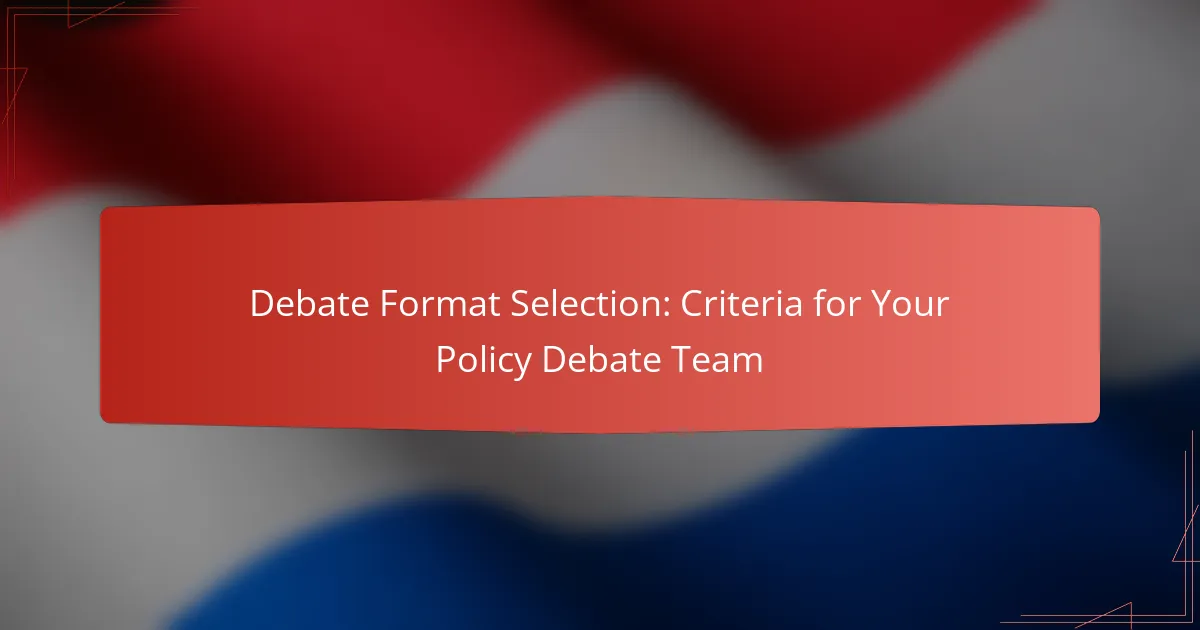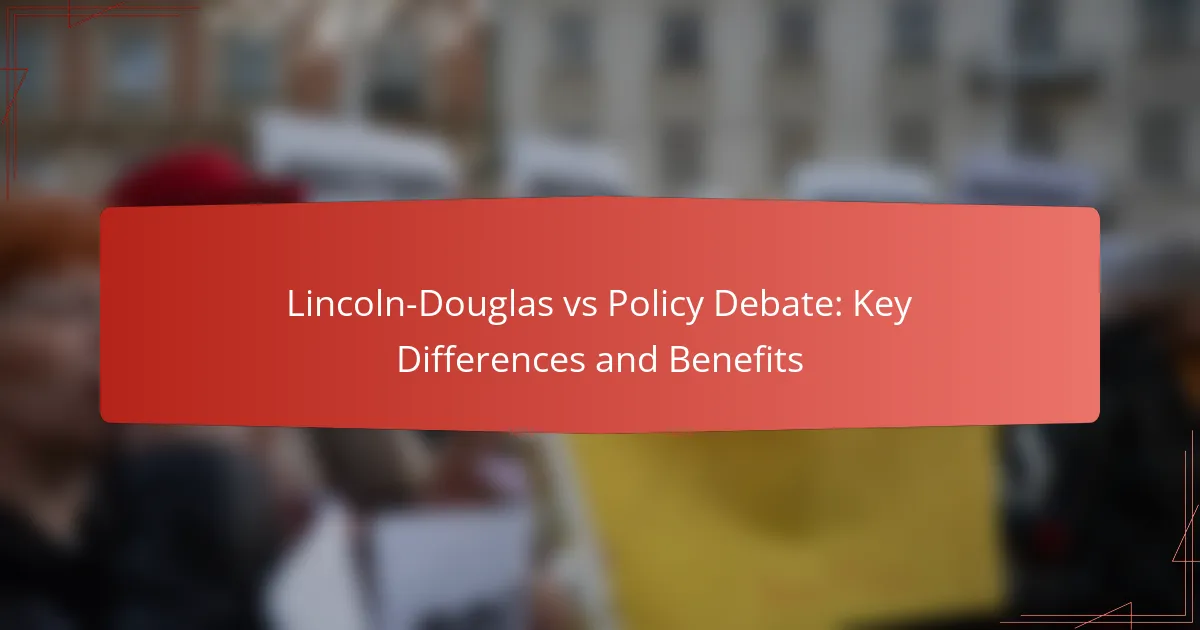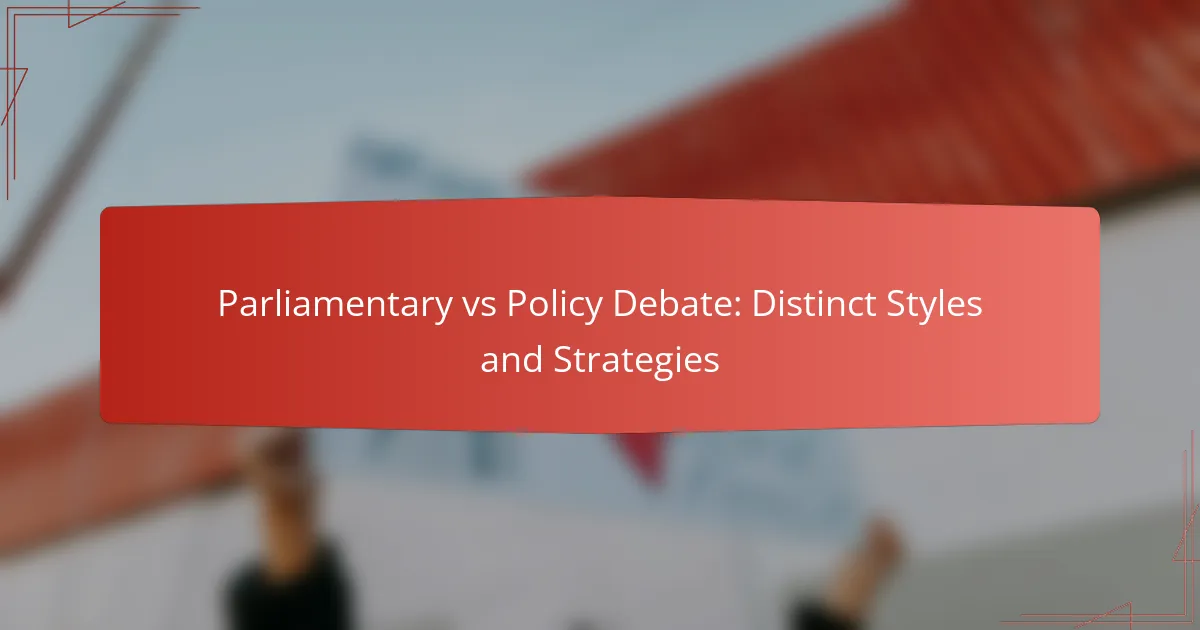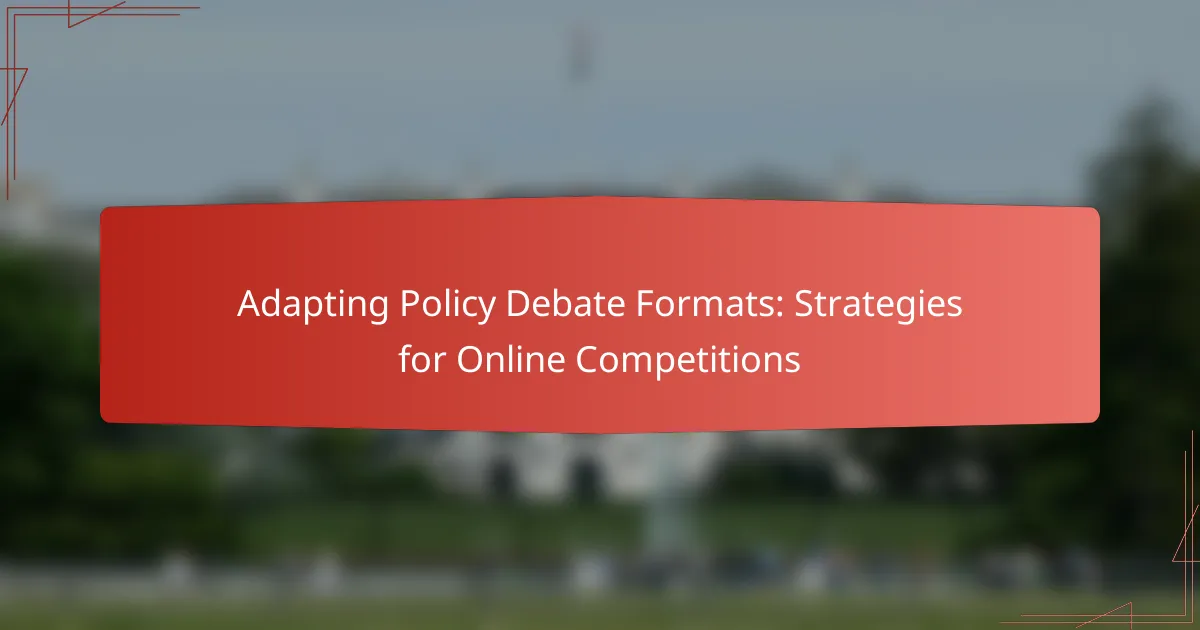Choosing the right debate format for your policy debate team is essential for maximizing their potential and effectiveness. Factors such as the team’s experience level, competition type, and desired skill development play a crucial role in this decision. By carefully evaluating these criteria, you can select a format that not only enhances performance but also engages your audience effectively.
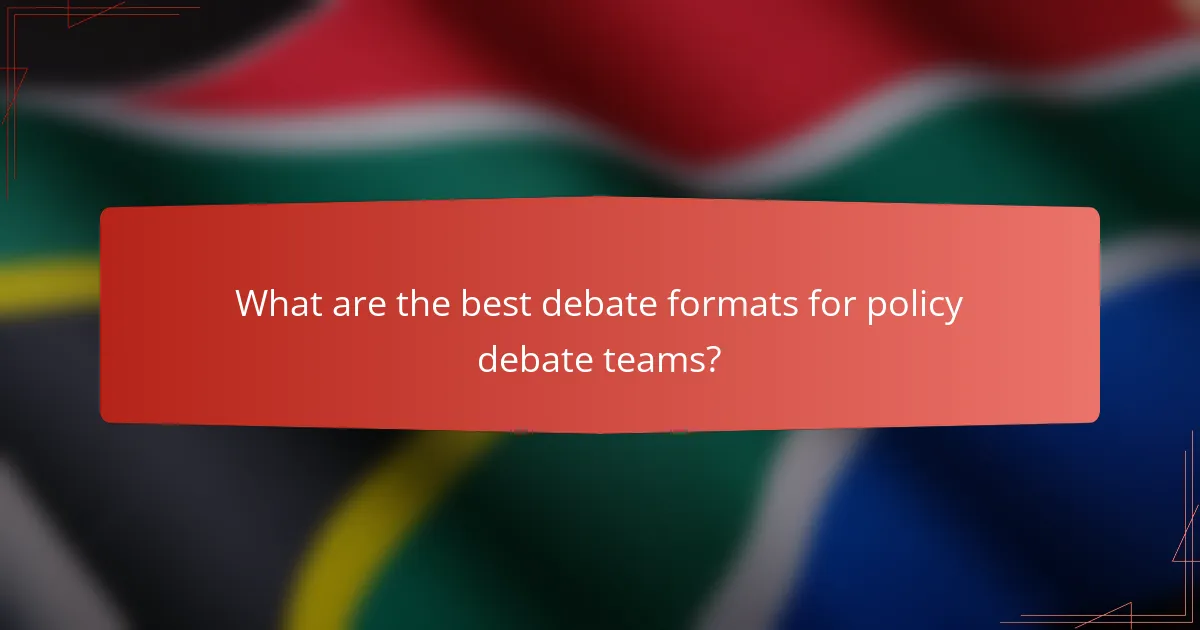
What are the best debate formats for policy debate teams?
The best debate formats for policy debate teams vary based on the team’s goals, experience level, and the skills they wish to develop. Each format offers unique structures and rules that can enhance critical thinking, argumentation, and public speaking abilities.
Lincoln-Douglas debate format
The Lincoln-Douglas debate format focuses on values and ethics, typically involving one-on-one debates. This format encourages debaters to explore philosophical arguments and moral implications of a resolution, making it ideal for those interested in ethical reasoning.
Debaters prepare for a 90-minute round, which includes constructive speeches, rebuttals, and cross-examinations. A common pitfall is overemphasizing facts at the expense of values, so teams should ensure their arguments reflect ethical considerations.
Public Forum debate format
Public Forum debate emphasizes accessibility and audience engagement, featuring two teams of two debaters each. The format revolves around current events and public policy issues, making it relevant and relatable for a wider audience.
Each round lasts about 35 minutes, with speeches alternating between teams. Debaters should focus on clarity and persuasion, avoiding overly technical jargon. A key tip is to practice delivering arguments in a way that resonates with non-expert audiences.
Team Policy debate format
The Team Policy debate format involves two teams of two, debating a policy resolution that typically addresses a significant national or international issue. This format allows for in-depth research and extensive preparation, making it suitable for teams that enjoy rigorous analysis.
Rounds can last up to 2 hours, with each team presenting constructive speeches, rebuttals, and cross-examinations. Teams should be cautious of overwhelming judges with excessive evidence; instead, focus on clear, impactful arguments that highlight the policy’s implications.
World Schools debate format
The World Schools debate format combines elements of both prepared and impromptu debates, featuring teams of three to five members. This format encourages teamwork and adaptability, as teams must prepare for both sides of a resolution.
Debates typically last around 30 minutes, with a mix of prepared and spontaneous topics. A common challenge is balancing preparation with flexibility; teams should practice both structured arguments and quick thinking to excel in this format.
Parliamentary debate format
The Parliamentary debate format simulates a parliamentary setting, where teams of two debate on motions that can range from serious to humorous topics. This format is fast-paced and emphasizes quick thinking and effective communication.
Rounds usually last about 30 minutes, with limited preparation time. Debaters should focus on being concise and persuasive, as the format rewards clarity and wit. A helpful tip is to practice speaking extemporaneously to build confidence in spontaneous argumentation.
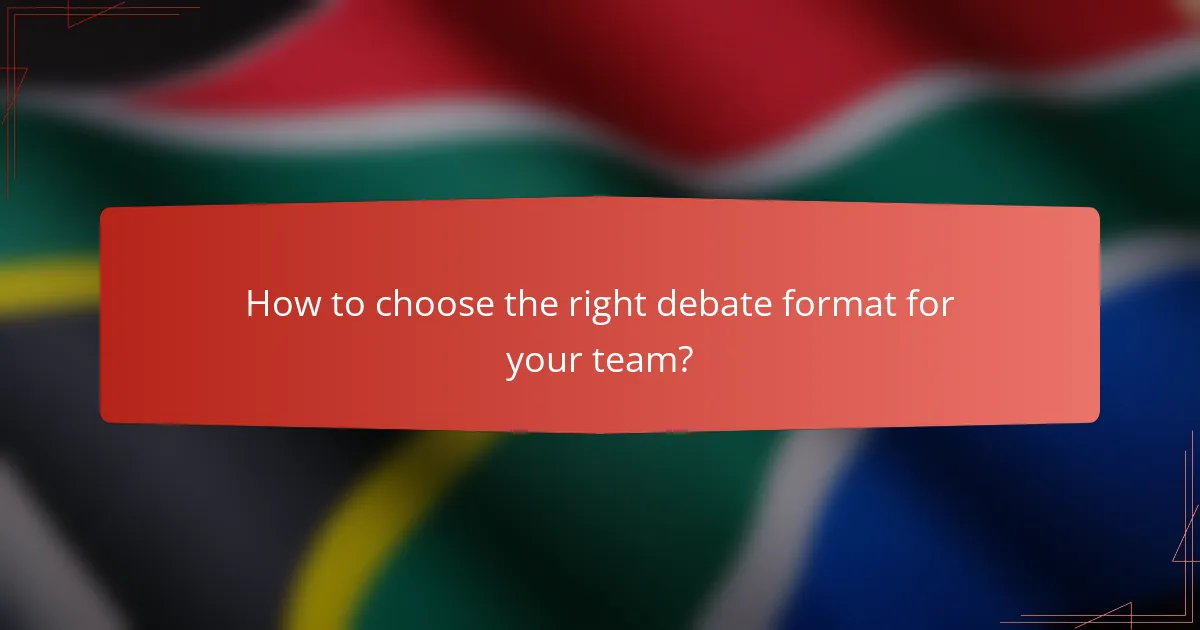
How to choose the right debate format for your team?
Selecting the right debate format for your team involves understanding your team’s capabilities, the level of competition, available resources, and how to engage your audience effectively. A well-chosen format can enhance performance and make debates more impactful.
Assess team strengths and weaknesses
Begin by evaluating your team’s strengths and weaknesses in various debate formats. Consider factors such as speaking skills, research abilities, and teamwork. For instance, if your team excels in quick thinking but struggles with extensive research, a format that emphasizes rebuttals may be more suitable.
Conduct mock debates in different formats to identify where your team performs best. This hands-on approach can reveal preferences and areas for improvement, helping you make an informed decision.
Consider competition level
The level of competition you expect to face plays a crucial role in format selection. If your team is competing against highly skilled opponents, a more structured format like Policy Debate may be necessary to ensure thorough argumentation and rebuttal. Conversely, if the competition is less intense, a less formal format might suffice.
Research the typical formats used in your target competitions. This knowledge can help you align your preparation with the expectations of judges and other teams, increasing your chances of success.
Evaluate available resources
Assess the resources your team has at its disposal, including time, research materials, and coaching. Some debate formats require extensive preparation and access to a wide range of sources, while others may be more forgiving. For example, Lincoln-Douglas Debate often demands less research than Policy Debate.
Consider your team’s schedule and the time commitment required for each format. Ensure that your team can dedicate sufficient time to prepare without overwhelming members, which can lead to burnout.
Understand audience engagement
Different debate formats engage audiences in various ways. Formats that allow for more interaction, such as Public Forum Debate, may resonate better with general audiences, while formats like Policy Debate might appeal more to judges familiar with technical arguments. Understanding your audience can guide your choice.
Consider hosting practice debates with different formats to gauge audience reactions. This feedback can provide insights into which formats not only suit your team but also captivate viewers, enhancing overall debate experience.
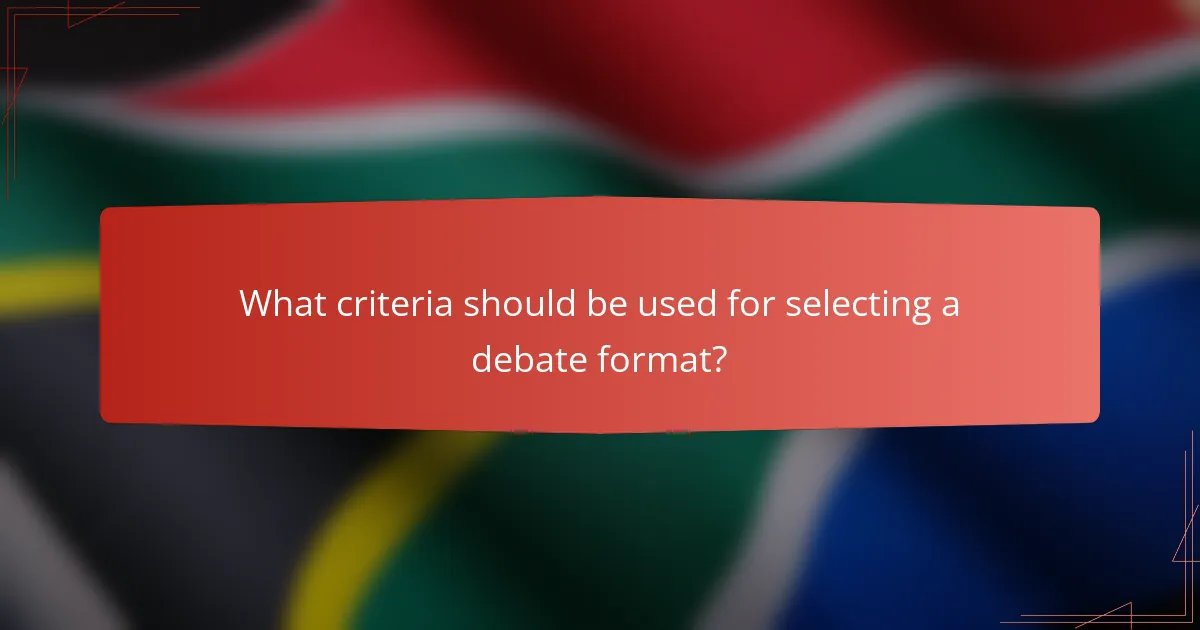
What criteria should be used for selecting a debate format?
Selecting a debate format involves evaluating several key criteria that align with your team’s strengths and the nature of the debate topic. These criteria include the team’s experience level, the complexity of the debate topic, judging preferences, and time constraints.
Team experience level
The experience level of your debate team significantly influences the choice of format. Novice teams may benefit from simpler formats that allow for more structured arguments and less pressure, such as Lincoln-Douglas debates. In contrast, experienced teams might thrive in more complex formats like Policy Debate, which require advanced argumentation and strategic planning.
Consider conducting a skills assessment to gauge your team’s strengths and weaknesses. This can help determine whether a more straightforward or intricate format would be more beneficial for skill development and competitive success.
Debate topic complexity
The complexity of the debate topic is crucial in format selection. Topics that require extensive research and nuanced understanding, such as those involving policy analysis or ethical dilemmas, are better suited for formats like Policy Debate. Simpler topics might be effectively addressed in formats like Public Forum, which emphasize clarity and persuasion over technical detail.
Evaluate the topic’s depth and breadth when choosing a format. A highly technical topic may necessitate a longer format to allow for thorough exploration, while a straightforward topic might be adequately covered in a shorter, more accessible format.
Judging criteria and preferences
Time constraints and format length
Time constraints play a critical role in determining the appropriate debate format. Formats like Policy Debate typically require longer preparation and speaking times, while formats such as Public Forum are designed for quicker exchanges. Assess the available time for preparation and the debate itself to ensure the chosen format is feasible.
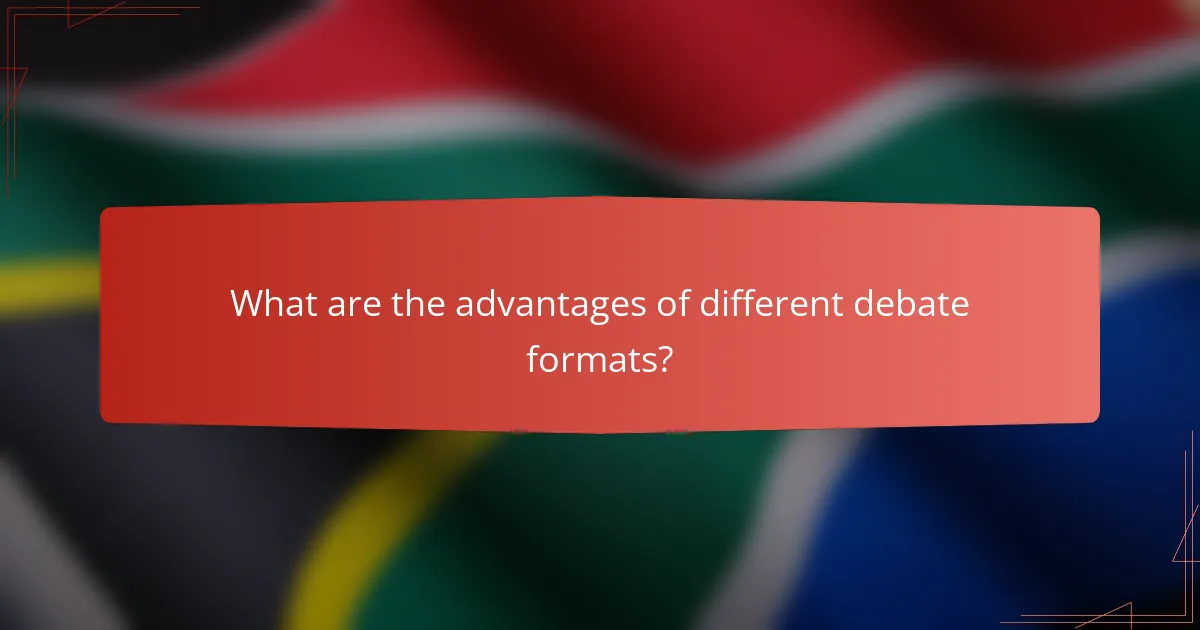
What are the advantages of different debate formats?
Different debate formats offer unique advantages that can enhance the skills and experiences of participants. Understanding these benefits helps teams select the most suitable format based on their goals and strengths.
Engagement in Lincoln-Douglas format
The Lincoln-Douglas format emphasizes individual engagement and moral reasoning, making it ideal for debaters who excel in persuasive speaking. This format typically involves one-on-one debates, allowing participants to deeply explore ethical dilemmas and philosophical questions.
Debaters should focus on constructing clear, value-based arguments and responding effectively to their opponent’s points. A common pitfall is overloading arguments with excessive detail, which can dilute the central message.
Flexibility in Public Forum format
Public Forum format is known for its flexibility and accessibility, making it suitable for teams that want to engage a broader audience. This format involves two teams of two, debating current events and public issues, which allows for a variety of argument styles and strategies.
Teams should prioritize clarity and audience engagement, often using relatable examples and straightforward language. Avoiding overly technical jargon helps maintain audience interest and understanding.
Depth in Team Policy format
The Team Policy format provides depth through collaborative research and argumentation, making it ideal for teams that thrive on in-depth analysis. This format involves two teams of two, focusing on policy proposals and their implications, often requiring extensive preparation and evidence.
Effective teams should develop comprehensive plans and anticipate counterarguments. A common mistake is neglecting the importance of rebuttals, which can weaken the overall case if not adequately addressed.
Collaboration in World Schools format
The World Schools format emphasizes collaboration and teamwork, making it suitable for teams that value cooperative debate. This format combines prepared and impromptu speeches, allowing participants to showcase their adaptability and teamwork skills.
Teams should practice both structured and spontaneous speaking to excel in this format. It’s essential to balance individual contributions with team cohesion, as a disjointed approach can hinder overall performance.
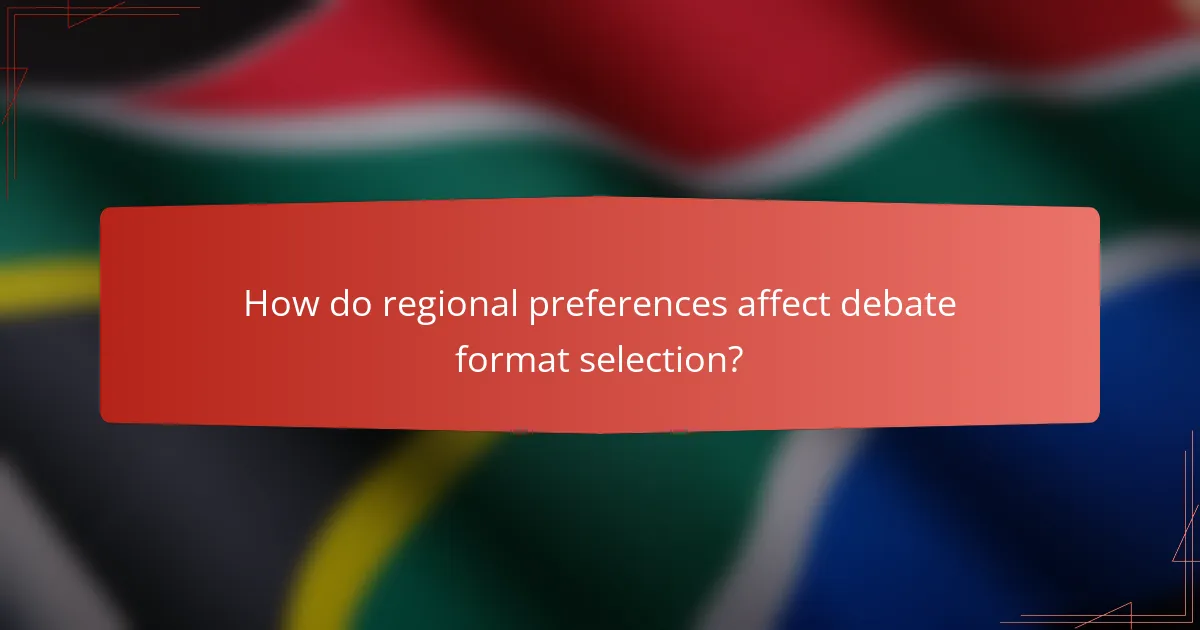
How do regional preferences affect debate format selection?
Regional preferences significantly influence the choice of debate formats, as different areas have established norms and practices that shape how debates are conducted. Understanding these preferences can help teams select a format that aligns with local expectations and maximizes their competitive edge.
Popularity of formats in the United States
In the United States, formats like Policy Debate and Lincoln-Douglas Debate are particularly popular at high school and collegiate levels. Policy Debate emphasizes extensive research and evidence-based arguments, while Lincoln-Douglas focuses on values and philosophical reasoning. Teams should consider which format aligns best with their strengths and preparation style.
Additionally, Public Forum Debate has gained traction due to its accessibility and focus on current events, making it appealing for a broader range of participants. When selecting a format, teams should evaluate their audience and the skills they wish to develop.
Trends in European debate formats
European debate formats, such as British Parliamentary and European Universities Debating Championship (EUDC), emphasize spontaneity and teamwork. British Parliamentary, for instance, involves four teams competing in pairs, which encourages quick thinking and adaptability. This format is increasingly popular among universities across Europe.
Another trend is the rise of online debate competitions, which have become more common due to recent global events. Teams should be aware of these shifts and consider how they might adapt their strategies and preparation to fit the evolving landscape of debate formats in Europe.
